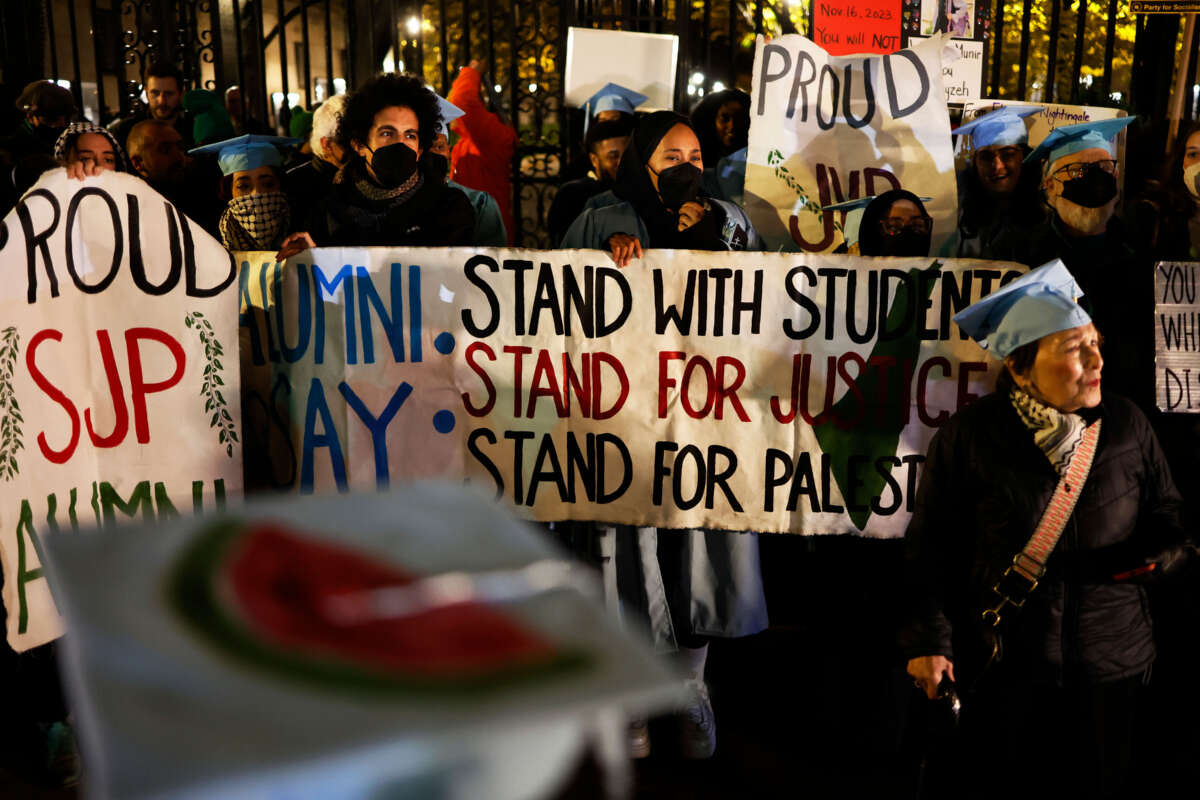The Rutgers-New Brunswick chapter of Students for Justice in Palestine (SJP) was notified on Monday that it had been suspended for “disruptive and disorderly conduct” and “failure to comply with university or civil authority.”
“Our university has chosen to suppress our voice, experiences and demands,” a speaker at a November 29 SJP news conference said.
SJP is a student-activist network of campus groups organizing for the liberation of Palestine. Since October 7, SJP groups have organized actions, including walkouts, teach-ins, vigils and marches, across the country to demand a ceasefire in Gaza. More than 18,600 Palestinians have been killed by Israeli attacks in Gaza since October 7, and more than 49,500 have been injured.
On October 25, hundreds of students participated in an SJP-organized “national walkout against U.S.-funded genocide.” Student leaders called for an immediate ceasefire in Gaza and for universities to support the movement for boycott, divestment, and sanctions (BDS) against Israel. The Friday after the national walkout, as reported by The Intercept, the U.S. Senate passed “a unanimous resolution condemning what it called ‘anti-Israel, pro-Hamas student groups’ across the country.”
In response to pro-Palestine student organizing, universities have cracked down on the SJP groups on their campuses. On October 24, Florida’s university system chancellor directed state universities to disband campus groups with ties to the national SJP after Gov. Ron DeSantis ordered officials to “deactivate” SJP chapters at the University of Florida and the University of South Florida. In November, the University of Florida SJP chapter, represented by American Civil Liberties Union, the ACLU of Florida, and Palestine Legal, sued the university system over the directive.
“As students on a public college campus, we have every right to engage in human rights advocacy and promote public awareness and activism for a just and reasonable solution to the Palestine-Israel conflict,” said the University of Florida’s SJP chapter. “We know we have First Amendment rights in school and we’re bringing this lawsuit to make sure the government doesn’t silence us or others like us.”
Brandeis University, Columbia University, and George Washington University have also suspended SJP chapters. A group of over 20 elected New York officials, including Rep. Alexandria Ocasio-Cortez (D), demanded that Columbia University reinstate its SJP chapter in November. Rutgers is the latest university to repress its SJP chapter.
Jonathan Friedman, director of free expression and education programs at PEN America, wrote in early December that while the details of each SJP chapter suspension vary, “they are united by a degree of opacity, in that university leaders have not been fully forthcoming in delineating how these student groups broke campus rules, or how the decision to suspend them was reached.”
Rutgers is one of a list of schools being investigated for “shared ancestry discrimination” by the Biden administration. The Biden administration’s investigation was allegedly prompted by an “alarming” nationwide increase of antisemitism, anti-Muslim and anti-Arab discrimination at colleges across the country.
Students organizing with SJP chapters have said that they have been harassed and physically assaulted without protection from their universities.
“We’ve been facing a lot of repression,” Dylan Kupsh, a Ph.D. candidate in computer science at UCLA and a SJP member, told Truthout in November. “Students on our campus are being harassed — physically assaulted, in some cases — and a lot of the times, the university has just watched.”
Press freedom is under attack
As Trump cracks down on political speech, independent media is increasingly necessary.
Truthout produces reporting you won’t see in the mainstream: journalism from the frontlines of global conflict, interviews with grassroots movement leaders, high-quality legal analysis and more.
Our work is possible thanks to reader support. Help Truthout catalyze change and social justice — make a tax-deductible monthly or one-time donation today.
